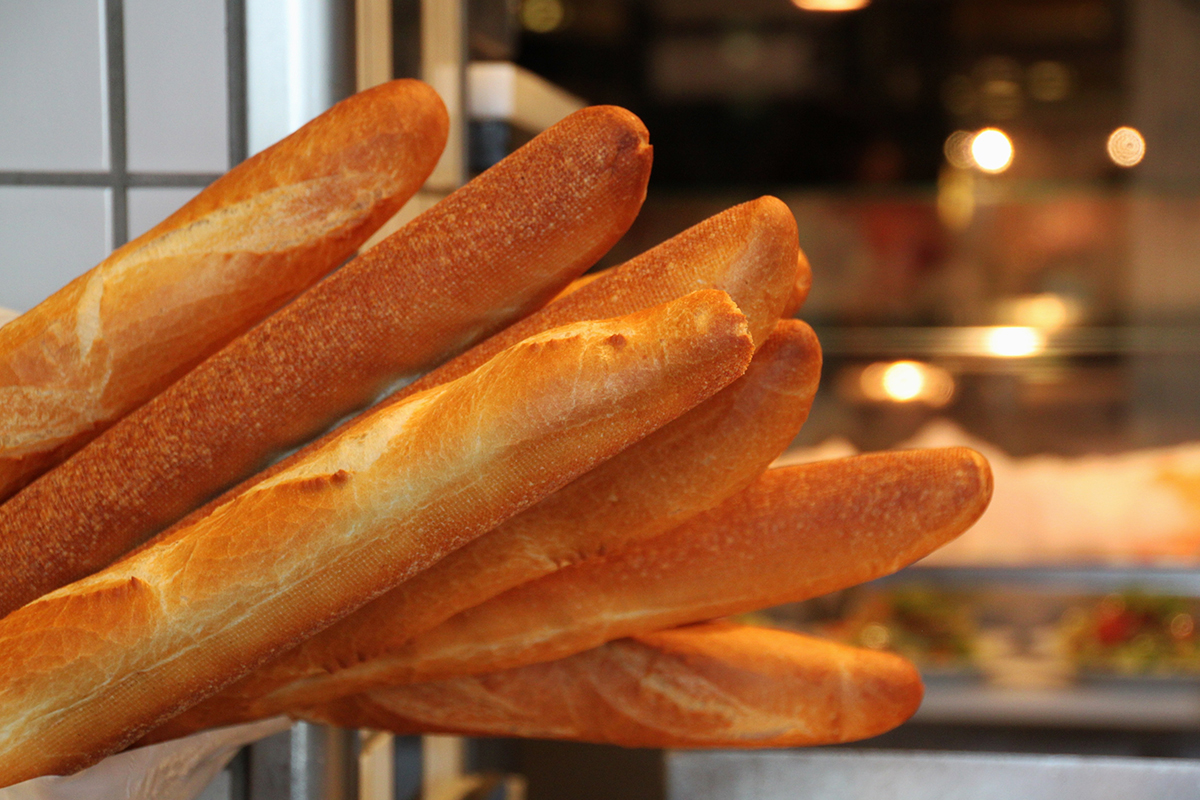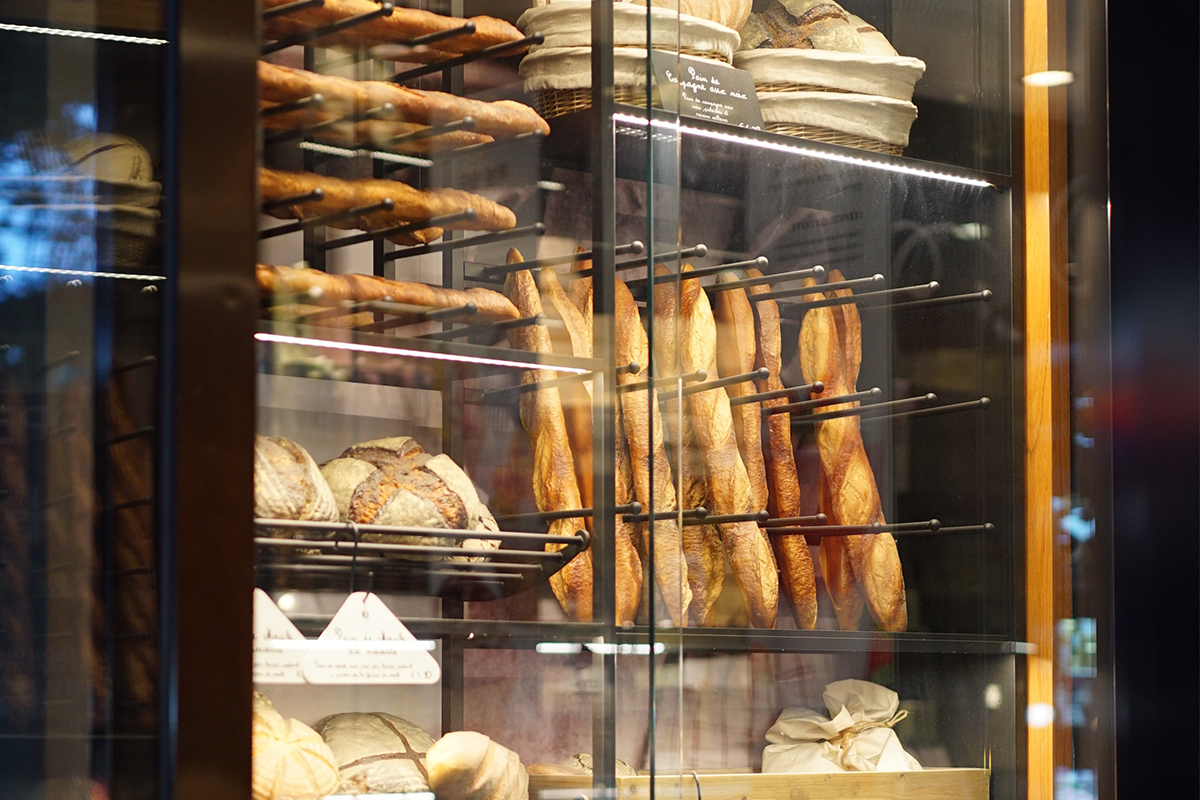
- Updated: 16.02.2024
Baguette Culture
The baguette, a quintessential French bread, has transcended its humble origins to become an enduring symbol of French culture and culinary excellence. Originating in France during the 18th century, the baguette has not only captured the hearts and palates of the French but has also become an internationally recognized icon. This essay delves into the rich history, cultural significance, and global impact of the baguette, exploring its evolution from a simple loaf of bread to a cultural phenomenon that embodies the essence of French identity. Traditional baguette recipes typically include the following basic ingredients: flour, water, yeast, salt, the baguette has a golden-brown crust that is crisp and crackly, while the inside is soft and airy with a slightly chewy texture. It is a staple in French cuisine and is often enjoyed with butter, cheese, pâté, or used as a base for sandwiches.
Historical Evolution of Baguette
The history of the baguette traces back to the aftermath of the French Revolution when bakers began experimenting with different bread shapes and sizes. The elongated, slender form of the baguette emerged as a response to the demand for a quick, portable, and affordable bread that could be easily carried by Parisians on their daily routines. By the 19th century, the baguette had become a staple in French households, solidifying its place in the country's culinary landscape.
Cultural Significance
The baguette's cultural significance extends far beyond its role as a mere food item. It embodies the French commitment to quality and tradition in culinary arts. French cuisine is celebrated globally, and the baguette is a prime example of the meticulous craftsmanship and attention to detail that characterizes French baking. The baguette is not just a bread; it is a cultural symbol that reflects the French way of life.
Moreover, the baguette has woven itself into the fabric of daily life in France. The traditional sight of a Parisian carrying a baguette under their arm is not just a cliché but a reflection of a genuine cultural practice. The baguette is not just a food item; it is a social and communal experience that brings people together, whether in a local boulangerie or at a family dinner table.
Boulangeries: Pillars of Baguette Culture
Boulangeries, or bakeries, are essential institutions in baguette culture. These establishments play a pivotal role in preserving and perpetuating the tradition of French bread-making. Bakers in boulangeries take immense pride in their craft, often following time-honored recipes and techniques passed down through generations. The aroma of freshly baked baguettes wafting through the streets of Paris is a testament to the central role boulangeries play in the daily lives of the French.
The Baguette and Daily Life
In France, the baguette is not merely a food item but an integral part of daily life. It is a versatile bread that complements various meals, from breakfast to dinner. The baguette's crusty exterior and soft interior make it a perfect accompaniment to cheese, charcuterie, soups, and stews. Its versatility has made it a staple in French households, and its presence on the dining table is a testament to its cultural significance.
Symbol of French Identity Abroad
While the baguette remains an enduring symbol of French culture, it has not been immune to challenges in the modern era. The rise of industrialization and mass production has led to concerns about the quality and authenticity of traditional baguettes. In response, artisanal bakers and organizations dedicated to preserving traditional baking methods have emerged, striving to maintain the integrity of this cultural icon. Beyond the borders of France, the baguette serves as a symbol of French identity. French expatriates and Francophiles around the world seek out local bakeries that can replicate the authentic taste and texture of a true French baguette. The global popularity of the baguette has led to its adaptation and incorporation into various culinary traditions, making it a symbol of cultural exchange and appreciation.
Paris Hotels Map
Booking.comChallenges and Modern Adaptations
While the baguette remains an enduring symbol of French culture, it has not been immune to challenges in the modern era. The rise of industrialization and mass production has led to concerns about the quality and authenticity of traditional baguettes. In response, artisanal bakers and organizations dedicated to preserving traditional baking methods have emerged, striving to maintain the integrity of this cultural icon.
Parisian Daily Rhythms
In the heart of Paris, where the Seine River weaves its way through cobblestone streets and elegant boulevards, a daily ritual unfolds that encapsulates the essence of Parisian life - the baguette. The iconic French bread is not merely a culinary delight; it is a cultural cornerstone, an integral part of Parisian identity that weaves its way into the very fabric of daily existence.
As the first rays of sunlight grace the city, the aroma of freshly baked baguettes begins to waft through the air. Parisians, with a nonchalant elegance, embark on their morning routine, a dance of routine and tradition that starts with a visit to the local boulangerie. Each Parisian arrondissement boasts its own hidden gem, a bakery cherished by the locals who swear by the quality of its baguettes, the average price of a baguette is 1.10 euros.
Lunchtime in Paris is not just a meal; it's a celebration of flavors, a communion with friends and colleagues. The baguette, a versatile companion, takes center stage. A platter of cheeses, cured meats, and a crusty baguette become the focal point of their conversation. The ritual of breaking bread, or rather, breaking baguette, creates a bond that transcends the mundane. Parisian daily life, with its nuances and rituals, finds its crescendo in the baguette. It is more than a staple; it is a symbol of community, tradition, and the timeless art of living well. In each loaf, Parisians find a reflection of their identity, a connection to the past, and a promise of another day woven into the tapestry of this enchanting city. There are now about 1,360 bakeries in the 20 arrondissements of Paris.
Le Boulanger de la Tour is the oldest Parisian bakery, founded in 1582, located in famous Latin Quarter, it's in the 5th arrondissement, see on the map 2 Rue du Cardinal Lemoine. There are several good hotels not far away: Hotel Pilgrim, Hotel Vendome Saint-Germain, Paris Art Hotel Quartier Latin by Malone, Hotel Abbatial Saint Germain.
Boulangerie

Conclusion
In recent years, efforts have been made to preserve and protect the authenticity of the baguette. In 1993, the French government introduced the "Law of May 13," which outlined strict regulations regarding the ingredients and methods used in baking traditional French bread. This law aimed to safeguard the cultural heritage of the baguette and ensure that it maintained its status as an integral part of French identity.
The baguette, with its rich history, cultural significance, and global impact, stands as a testament to the enduring legacy of
French culinary excellence. Beyond being a simple loaf of bread, the baguette embodies the spirit of a nation that takes pride in its
traditions, craftsmanship, and commitment to quality. As it continues to captivate palates around the world, the baguette remains a
symbol of French identity, connecting people through a shared appreciation for the artistry of baking and the joy of breaking bread together.